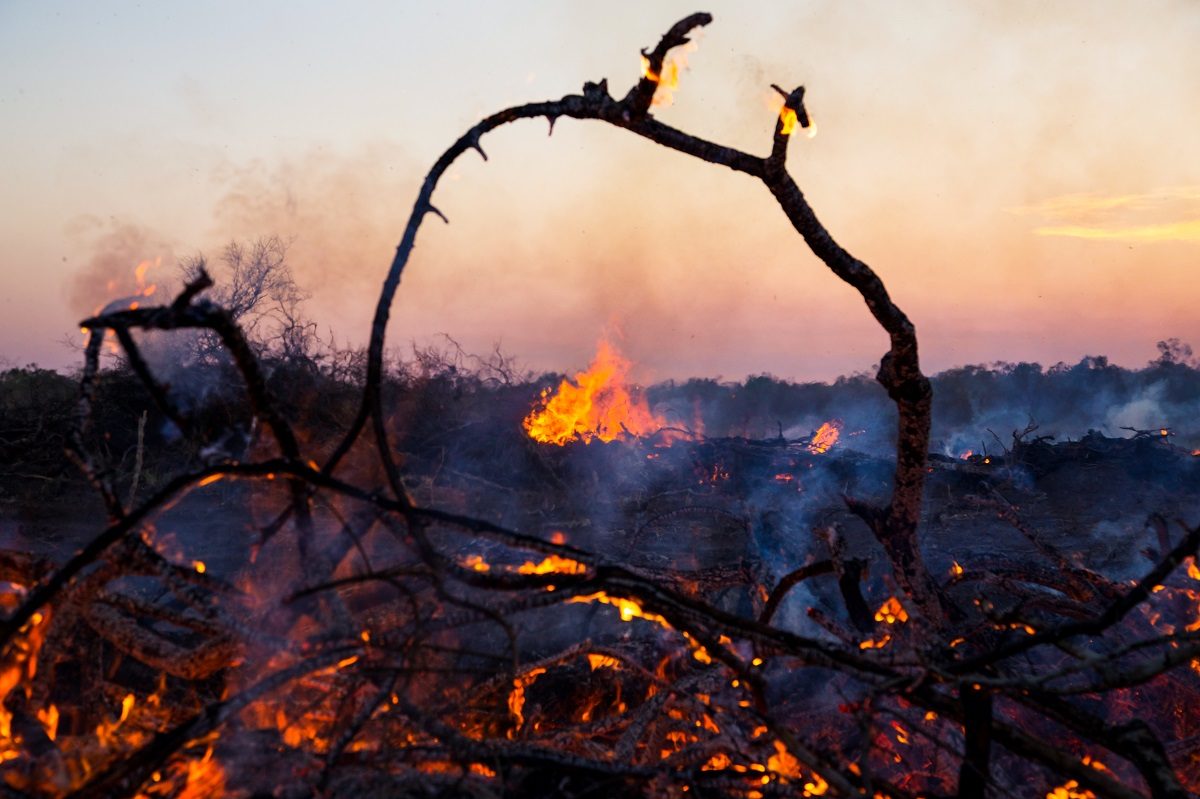- Soybeans, which make up the main feed for livestock that supply fast food chains like Burger King, occupy almost 1 million square kilometers (386,000 square miles) of land around the world.
- Through the investigation, researchers found that the production of some of Burger King’s meat may be linked to deforestation.
- The report focuses on the massive soy purchase operations of multinational agricultural corporations Cargill, Bunge, and Archer Daniels Midland.
When you bite into a Bacon King Sandwich, you could be indirectly eating away some of Brazil’s ancient savanna and Bolivia’s lowland forest. That’s because the two quarter-pound beef patties on that sandwich are part of a supply chain that includes mega-industrial soy crops and cattle ranches that could have environmental costs, according to the findings in a new report.
The report, titled “The Ultimate Mystery Meat,” was released by Mighty Earth and Rainforest Foundation Norway (RFN) in late February and expounds on the sheer extent of deforestation related to soy production. Almost 1 million square kilometers (386,000 square miles) around the world is dedicated to growing soybeans, the main feed used to for the livestock that eventually become some of the 11 million Bacon King Sandwiches and other products Burger King and others sell every day. The soy production area is equivalent to the total combined area of France, Germany, Belgium and the Netherlands.
In Brazil and Bolivia, the massive soy operations of multinational agricultural corporations Cargill and Bunge are particularly prevalent. Both Cargill and Bunge have signed “no deforestation” pledges, and Bunge has detailed a stated policy for a sustainable supply chain. Both companies buy soy from farmers and ship it globally as livestock feed for pigs, chickens, and cattle.
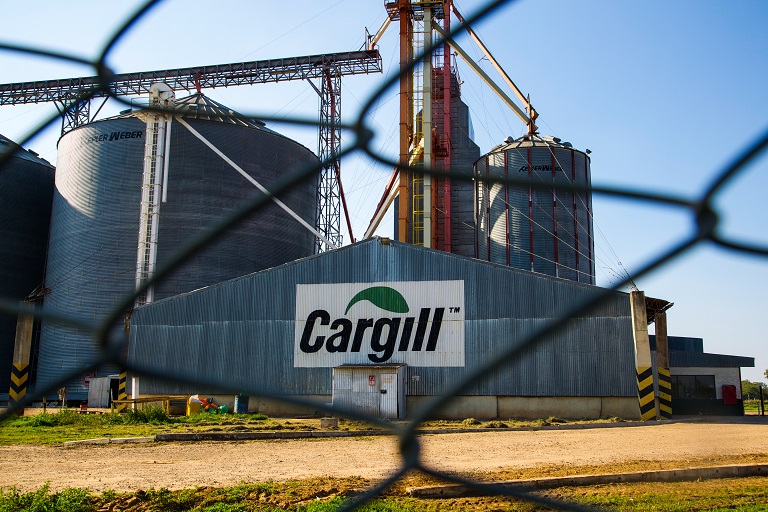
But the Mighty Earth report zeroes in one surprising connection: Burger King.
According to the report, the global fast food chain is sourcing the feed for its livestock from soy farms where Cargill and Bunge are the buyers – an enormous amount of the stuff, given the size of its operation, with over 15,000 restaurants spread out over 100 countries. That is big news because Burger King has never before revealed information about the sources of its meat, even when pressured for answers. The company has also been tight-lipped about sustainability and environmental consciousness. That’s in contrast to its competitors such as McDonald’s, which has made efforts be transparent and make sure its food products are not linked to illegal deforestation. Meanwhile, Burger King has turned down requests from civil society groups to provide more information about its food suppliers, and scored zero on the Union of Concerned Scientists’ 2016 scorecard of major beef sellers’ deforestation profiles.
“Burger King hamburgers are the ultimate mystery meat,” said Mighty Earth Campaign Director Kristin Urquiza in a statement. “We set out to find out where they come from, and what we saw wasn’t pretty. Burger King is ruling over a kingdom of deforestation.”
For the investigation, Mighty Earth visited 28 sites across 3,000 kilometers (1,864 miles) in Brazil and Bolivia where industrial-scale soy production and deforestation are most concentrated.
The investigation revealed how Bunge and Cargill – two of the world’s largest soy producers – are responsible for the deforestation of a combined 697,562 hectares of land in Brazil’s Cerrado between 2011 and 2015.
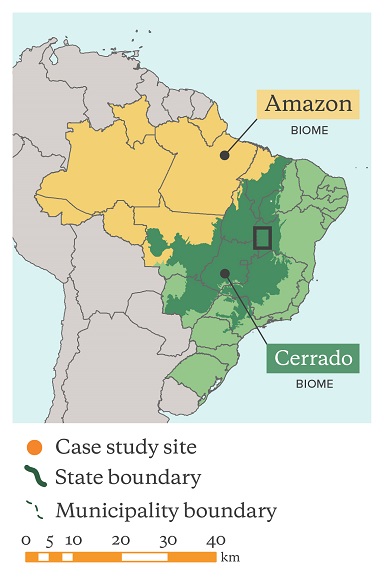
The Cerrado is the Brazilian savanna and covers more than 20 percent of the country. The native habitats of its wooded grasslands are being destroyed at a pace far faster than Brazilian Amazon, according to the WWF. The investigation highlighted how deforestation in areas like the Cerrado is threatening species of jaguar, sloth and giant anteater – and damaging Brazil’s primary watershed region, the Cerrado, which feeds the Amazon River and the Pantanal, the largest wetlands in the world. While much less prominent in the popular consciousness than the Amazon, Brazil’s scrubland Cerrado is the country’s most threatened habitat – roughly half of the Cerrado’s vegetation has been cleared, compared to 25 percent in the Amazon, according to the report.
Meanwhile, Cargill and Archer Daniels Midland, another large soy buyer in the United States, are the biggest players in Bolivia. An average of 289,000 hectares per year was deforested from Bolivia’s lowland rainforest between 2010-2015, according to a 2015 report from the UN’s Food and Agriculture Organization. Combined, that amounts to an area larger than the U.S. state of Delaware.
Burger King, Cargill and Archers Daniel Midland did not respond to requests for comment on the Mighty Earth report. In an email response, Bunge said that the report makes a “misleading correlation between Bunge’s presence in the Brazilian Cerrado and total deforestation figures in that region.” According to Stewart Lindsay, vice president of global corporate affairs for Bunge Limited, the company’s market share in the Matopiba region is only 20 percent. Matopiba is a collection of states in the Cerrado with the most deforestation for soy in the Cerrado, according to Mighty Earth.
“One company alone cannot solve this issue,” Lindsay stated, pointing to his company as a model for others. “A positive step would be for more companies to adopt zero deforestation commitments, apply controls to block crops grown in illegally cleared areas from entering their supply chains, report publicly on progress and invest millions of dollars to support sustainable land use planning efforts, all of which Bunge has done.”
Shared responsibility
The report does note that there are others clearing land in Brazil and Bolivia, though Cargill and Bunge are the most visible and influential drivers because of their size. Cargill is the United States’ largest privately held company in terms of revenue and earned over $107 billion last year alone. It is a global leader in trade of soy, palm oil, cattle, cotton, and other commodities. They have 150,000 employees in 70 countries, according to the company’s website. Bunge is publicly traded and deals largely in South America, particularly Brazil. The agribusiness outfit dominates the Cerrado region and is involved in the purchase of grain, building silos and roads, and more. According to the company, it has the capacity to crush over 40 million tons of soy and also trades in grains and oilseeds.
Those farther down the supply chain, like Burger King, could be contributing to the problem.
“Burger King lacks policies to avoid that the food they sell contributes to forest destruction. This is unacceptable. They don’t even seem to care,” said Nils Hermann Ranum, head of the policy and campaign department at RFN, in a statement.
Mighty Earth’s investigation also revealed the human cost of soy expansion and linked agribusiness to land grabbing and violence, which has spiked in recent years.
“We found indigenous communities displaced from their land and their diverse food cultures turned into monoculture crops; they now live on the edge of huge soy fields and are often sprayed with toxic pesticides,” said Glenn Hurowitz, chief executive of Mighty Earth, in an interview. “They have been reduced to eking out an existence.”
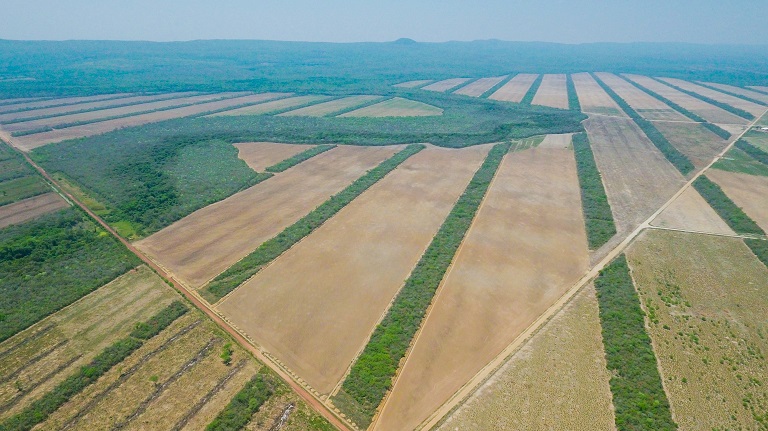
The report also points to the impact that global soy traders like Bunge and Cargill have had by monopolizing crops and financing roads, infrastructure and even illegal land-clearing operations.
In countries with major land-related problems like Brazil, the expansion of soy and cattle ranching often comes at a deadly price. Between 2002-2013, half of murdered environmentalists globally (448) were in Brazil, according to Global Witness, a U.S.-based human rights watchdog that focuses on the exploitation of natural resources and corruption. Outspoken environmental officials have also gotten caught in the crossfire, as happened in October 2016 with Luiz Alberto Araújo. Global Witness notes that more land defenders were assassinated in Brazil in 2015 than in any other country worldwide – a total of 50, the majority of whom were indigenous.
Soy is key
It all comes down to soy production, which, along with cattle ranching, is the biggest driver of deforestation in South America. According to the report, around three-quarters of the world’s soy goes to animal feed, and approximately four million hectares of forest was cleared each year to make way for soy crops and cattle ranches in South America from 2001-2010.
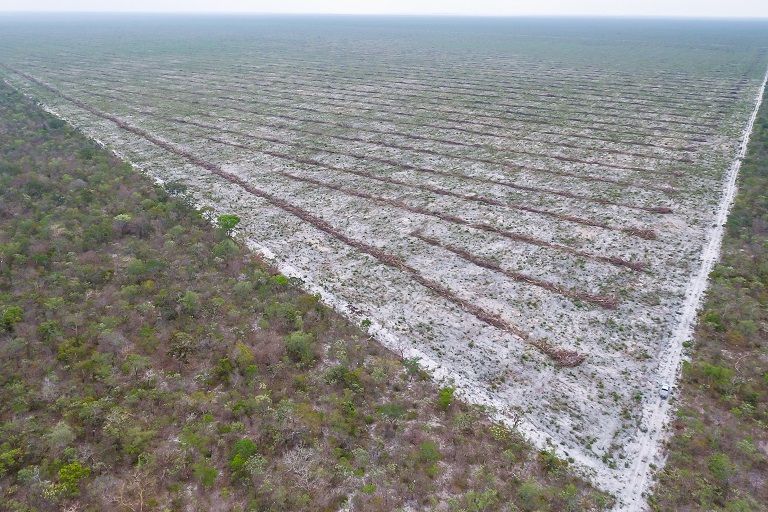
The report states: “Burger King should use its wealth and influence in a positive way by joining others in the fast food industry to adopt and implement a strong ‘No Deforestation, No Exploitation’ policy. It should publish its suppliers and report on their compliance with sustainability policies.”
Many companies worldwide, including Bunge, have joined a soy moratorium to end deforestation in the Amazon, but other regions like the Cerrado that are just as fragile are seen as up for grabs because they aren’t perceived as being in a state of emergency. Mighty Earth and RFN are calling on the companies they investigated to join the moratorium and extend it to other regions like the Cerrado.
Meanwhile, Green Century Capital Management, an influential US-based sustainability investment firm, has sent an open letter to 21 companies including Archer Daniels Midland, Bunge, and Cargill, calling on them to embark on a zero-deforestation initiative. The action was by supported 38 investors worldwide.
Banner image: Logs burn at sunset in Bolivia. Photo by Jim Wickens/Ecostorm.
Maximo Anderson is a freelance journalist and photographer currently based in South America. You can find him on Twitter at @MaximoLamar.
FEEDBACK: Use this form to send a message to the author of this post. If you want to post a public comment, you can do that at the bottom of the page.
